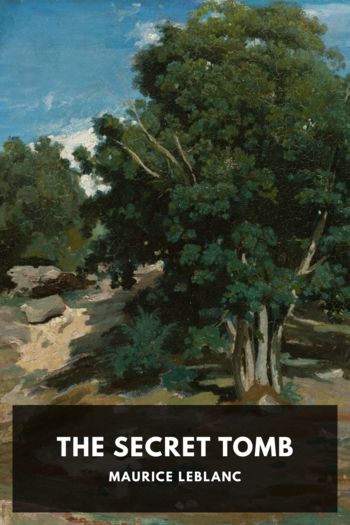The Secret Tomb Maurice Leblanc (best love story novels in english .TXT) 📖

- Author: Maurice Leblanc
Book online «The Secret Tomb Maurice Leblanc (best love story novels in english .TXT) 📖». Author Maurice Leblanc
Dorothy had to bend lower so shaky and illegible did the writing become; and it was with great difficulty that she was able, syllable by syllable, to decipher it:
“Three words written … tattooed … as sailors do … three words … Good God! … these three words! The words on the medal! … In robore fortuna!”
That was all. The unfinished sheet showed nothing more but undecipherable characters, which Dorothy did not even try to make out.
For a long while she sat with bowed head, the tears falling from her half-closed eyes. They perceived that the circumstances in which, in all likelihood, her father had died, had brought back all her grief.
The Count, however, continued:
“The fever must have returned … the delirium … and not knowing what he was doing, he must have drunk the poison. Or, at any rate, it is a plausible hypothesis … for what else could it have been that this hand poured into the glass? But I confess that we have not arrived at any certainty in the matter. D’Estreicher and Raoul’s father, at once apprized by me of what had happened, accompanied me to Chartres. Unfortunately, the staff, the surgeon-major and the two nurses had been changed, so that I was brought up short against the official document which ascribed the death to infectious complications. Moreover, ought we to have made further researches? My two cousins were not of that opinion, neither was I? A crime? … How to prove it? By means of these lines in which a sick man describe a nightmare which has ridden him? Impossible. Isn’t that your opinion, mademoiselle?”
Dorothy did not answer; and it put the Count rather out of countenance. He seemed to defend himself—not without a touch of temper:
“But we could not, Mademoiselle! Owing to the war, we ran against endless difficulties. It was impossible! We had to cling to the one fact which we had actually learned and not venture beyond this actual fact which I will state in these terms: In addition to us four, to us three rather, since Jean d’Argonne, alas! was no more, there was a fourth person attacking the problem which we had set ourselves to solve; and that person, moreover, had a considerable advantage over us. A rival, an enemy had arisen, capable of the most infamous actions to attain his end. What enemy?
“Events did not allow us to busy ourselves with this affair, and what is more, prevented us from finding you as we should have wished. Two letters that I wrote to you at Bar-le-Duc remained unanswered. Months passed. Georges Davernoie was killed at Verdun, d’Estreicher wounded in Artois, and I myself despatched on a mission to Salonica from which I did not return till after the Armistice. In the following year the work here was begun. The housewarming took place yesterday, and only today does chance bring you here.
“You can understand, Mademoiselle, how amazed we were when we learned, step by step, first that excavations were being made without our knowing anything about it, that the places in which they had been made were explained by the word Fortuna, which bore out exactly the inscription which your father had read twice, on the gold medal and on the arm which stole the gold medal from him. Our confidence in your extraordinary clearsightedness became such that Madame de Chagny and Raoul Davernoie wished you to be informed of the complete history of the affair; and I must admit that the Countess de Chagny displayed remarkable intuition and judgment since the confidence we felt in you was really placed in that Yolande d’Argonne whom her father recommended to us. It is then but natural, mademoiselle, that we should invite you to collaborate with us in our attempt. You take the place of Jean d’Argonne, as Raoul Davernoie has taken the place of Georges Davernoie. Our partnership is unbroken.”
A shadow rested on the satisfaction that the Count de Chagny was feeling in his eloquence and magnanimous proposal. Dorothy maintained an obstinate silence. Her eyes gazed vacantly before her. She did not stir. Was she thinking that the Count had not taken much trouble to discover the daughter of his kinsman Jean d’Argonne and to rescue her from the life she was leading? Was she still feeling some resentment on account of the humiliation she had suffered in being accused of stealing the earrings?
The Countess de Chagny questioned her gently:
“What’s the matter, Dorothy? This letter has filled you with gloom. It’s the death of your father, isn’t it?”
“Yes,” said Dorothy after a pause in a dull voice. “It’s a terrible business.”
“You also believe that they murdered him?”
“Certainly. If not, the medal would have been found. Besides, the last sheets of the letter are explicit.”
“And it’s your feeling that we ought to have striven to bring the murderer to book?”
“I don’t know … I don’t know,” said the young girl slowly.
“But if you think so, we can take the matter up again. You may be sure that we will lend you our assistance.”
“No,” she said. “I will act alone. It will be best. I will discover the guilty man; and he shall be punished. I promise my father he shall. I swear it.”
She uttered these words with measured gravity, raising her hand a little.
“We will help





Comments (0)